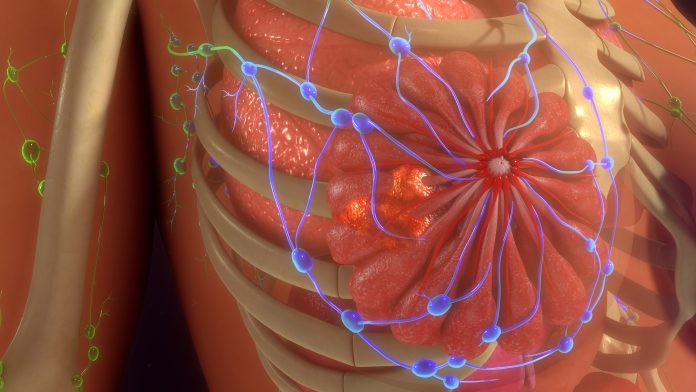
Scientists from King’s College London have made a significant breakthrough in the treatment of aggressive breast cancer by developing a tailored drug that exploits the cancer cells’ weaknesses. This innovative approach, published in Clinical Cancer Research and funded by Breast Cancer Now, offers new hope for patients with triple-negative breast cancer, a particularly challenging form of the disease.
Triple-negative breast cancer, which accounts for 15 percent of all breast cancer diagnoses, is known for its aggressiveness, resistance to chemotherapy, and lower survival rates. This type of cancer is more common in women under 40 and typically evades conventional treatments such as surgery, chemotherapy, and radiotherapy, often returning to spread again.
The research team at King’s College London conducted an extensive analysis of over 6,000 breast cancer samples to identify properties associated with aggressive and chemotherapy-resistant cancers. Their investigation focused on understanding the cancer cells’ biology, including what is expressed on the tumor and cell surface, as well as the internal mechanisms that allow cancer cells to escape from drugs.
Through their analysis, the scientists identified the cancer cell surface marker EGFR and oncogenic molecules known as cyclin-dependent kinases (CDK), which are critical for cell division and proliferation. Using this knowledge, they developed a novel treatment by linking cetuximab, a tumor-selective antibody that targets the EGFR protein, with a CDK-blocking drug. This combination creates a tailored antibody-drug conjugate specifically designed to target and kill breast cancer cells.
Lead author Professor Sophia Karagiannis explained the significance of this discovery: “We were on the hunt for cancer’s vulnerabilities and now we’ve found out how we can guide our therapies to one of these. We combined these two drugs to create a tailored antibody-drug conjugate for patients with this aggressive cancer. The antibody guides the toxic drug directly to the cancer cell, which offers the possibility for a lower dose and fewer adverse side effects.”
This targeted approach means that a lower dose of the inhibitor drug can be administered, reducing the toxicity for patients while effectively attacking the cancer cells. The antibody-drug conjugate specifically targets the cancer cell, minimizing harm to healthy cells and potentially leading to better patient outcomes.
Lead research scientist Anthony Cheung emphasized the importance of their findings: “Triple-negative breast cancer represents a molecularly and clinically diverse disease. By exploiting EGFR overexpression and dysregulated cell cycle molecules in selected patient groups, the antibody-drug conjugate, but not the antibody alone, could stop the cancer cell from dividing and engender cytotoxic functions specifically against the cancer cells.”
Simon Vincent, director of services, support, and influencing at Breast Cancer Now, highlighted the potential impact of this research: “Each year, around 8,000 women in the U.K. are diagnosed with triple-negative breast cancer, which is typically more aggressive than other breast cancers and more likely to return or spread following treatment. This exciting research has not only improved our understanding of the properties of aggressive breast cancer cells that are resistant to chemotherapy but has also brought us closer to developing a targeted therapy that destroys these cancer cells while minimizing side effects for patients.”
While more work is needed before this therapy can reach clinical use, the researchers are optimistic about its potential. Professor Karagiannis and her team hope that their concept will pave the way for new antibody-drug conjugates tailored to different patient groups, providing new treatment options for cancers with unfavorable prognoses.













